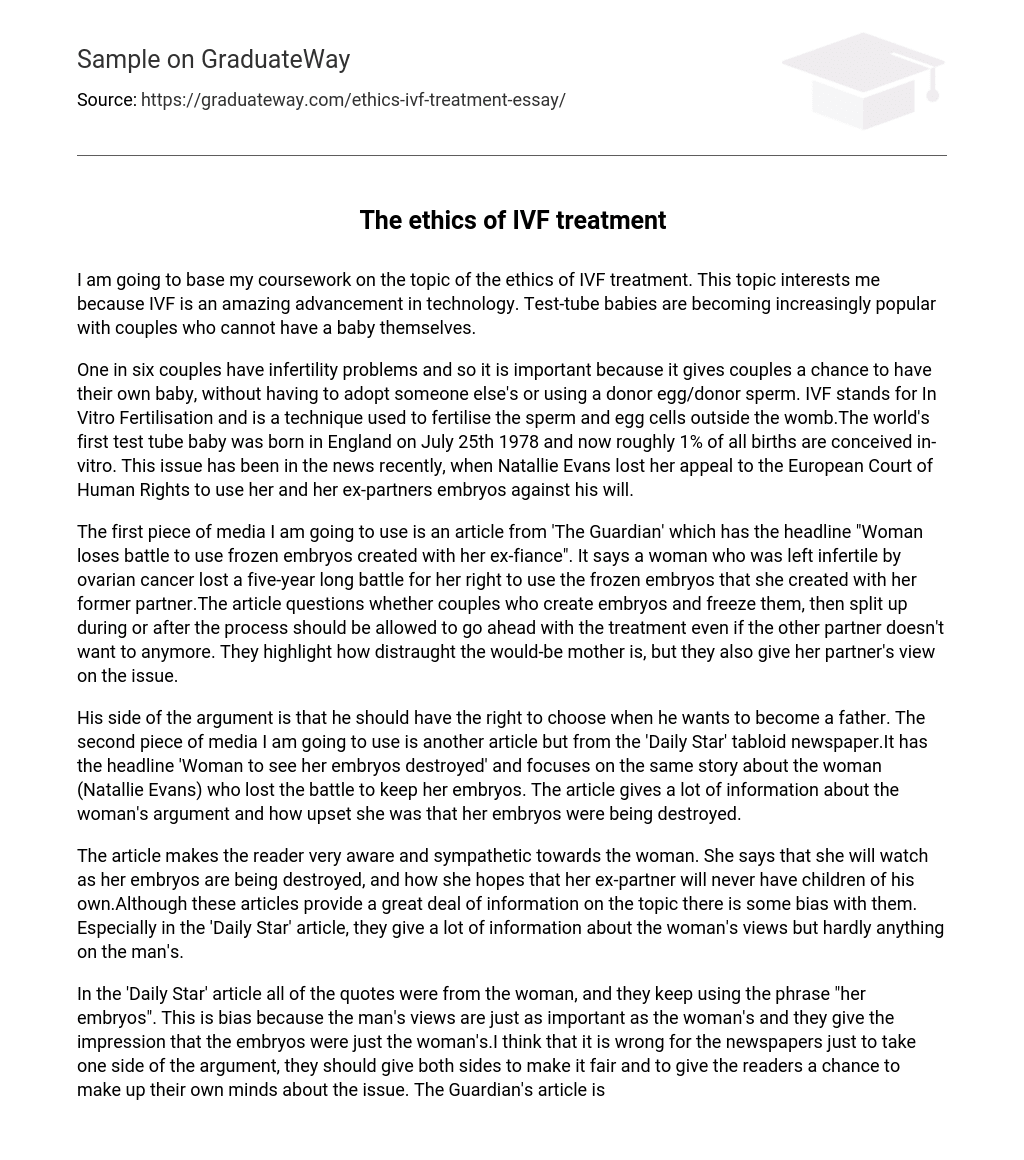I am going to base my coursework on the topic of the ethics of IVF treatment. This topic interests me because IVF is an amazing advancement in technology. Test-tube babies are becoming increasingly popular with couples who cannot have a baby themselves.
One in six couples have infertility problems and so it is important because it gives couples a chance to have their own baby, without having to adopt someone else’s or using a donor egg/donor sperm. IVF stands for In Vitro Fertilisation and is a technique used to fertilise the sperm and egg cells outside the womb.The world’s first test tube baby was born in England on July 25th 1978 and now roughly 1% of all births are conceived in-vitro. This issue has been in the news recently, when Natallie Evans lost her appeal to the European Court of Human Rights to use her and her ex-partners embryos against his will.
The first piece of media I am going to use is an article from ‘The Guardian’ which has the headline “Woman loses battle to use frozen embryos created with her ex-fiance”. It says a woman who was left infertile by ovarian cancer lost a five-year long battle for her right to use the frozen embryos that she created with her former partner.The article questions whether couples who create embryos and freeze them, then split up during or after the process should be allowed to go ahead with the treatment even if the other partner doesn’t want to anymore. They highlight how distraught the would-be mother is, but they also give her partner’s view on the issue.
His side of the argument is that he should have the right to choose when he wants to become a father. The second piece of media I am going to use is another article but from the ‘Daily Star’ tabloid newspaper.It has the headline ‘Woman to see her embryos destroyed’ and focuses on the same story about the woman (Natallie Evans) who lost the battle to keep her embryos. The article gives a lot of information about the woman’s argument and how upset she was that her embryos were being destroyed.
The article makes the reader very aware and sympathetic towards the woman. She says that she will watch as her embryos are being destroyed, and how she hopes that her ex-partner will never have children of his own.Although these articles provide a great deal of information on the topic there is some bias with them. Especially in the ‘Daily Star’ article, they give a lot of information about the woman’s views but hardly anything on the man’s.
In the ‘Daily Star’ article all of the quotes were from the woman, and they keep using the phrase “her embryos”. This is bias because the man’s views are just as important as the woman’s and they give the impression that the embryos were just the woman’s.I think that it is wrong for the newspapers just to take one side of the argument, they should give both sides to make it fair and to give the readers a chance to make up their own minds about the issue. The Guardian’s article is much more even-handed because it takes quotes from both the woman and the man, and does not appear to take a side.
My opinion on this issue is that both people should have the right to choose whether or not they want to carry on with IVF. If one of them doesn’t feel that they want to become a parent (for any reason) then the treatment should not continue, even if the other person disagrees.As the European Court of Human Rights told Natallie Evans, “..
. her rights to become a mother did not outweigh the rights of Mr Johnston not to become the father of her children”. Men and woman should have equal rights, especially in something as important as having a baby. I think that the woman in the article was being very selfish to say that she hoped her ex-partner would never have children of his own just because she can’t.
However, I feel quite sorry for the woman and can see why she is upset.





